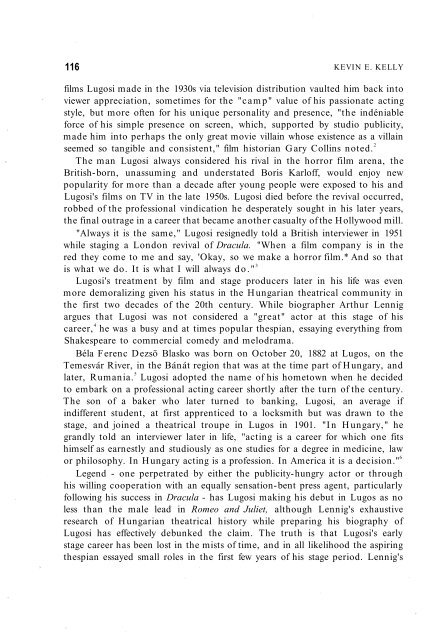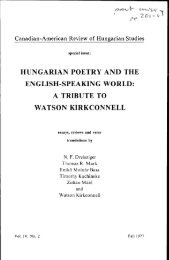116 KEVIN E. KELLYfilms Lugosi made in the 1930s via television distribution vaulted him back intoviewer appreciation, sometimes for the "camp" value of his passionate actingstyle, but more often for his unique personality and presence, "the indéniableforce of his simple presence on screen, which, supported by studio publicity,made him into perhaps the only great movie villain whose existence as a villainseemed so tangible and consistent," film historian Gary Collins noted. 2The man Lugosi always considered his rival in the horror film arena, theBritish-born, unassuming and understated Boris Karloff, would enjoy newpopularity for more than a decade after young people were exposed to his andLugosi's films on TV in the late 1950s. Lugosi died before the revival occurred,robbed of the professional vindication he desperately sought in his later years,the final outrage in a career that became another casualty of the Hollywood mill."Always it is the same," Lugosi resignedly told a British interviewer in 1951while staging a London revival of Dracula. "When a film company is in thered they come to me and say, 'Okay, so we make a horror film.* And so thatis what we do. It is what I will always do." 3Lugosi's treatment by film and stage producers later in his life was evenmore demoralizing given his status in the Hungarian theatrical community inthe first two decades of the 20th century. While biographer Arthur Lennigargues that Lugosi was not considered a "great" actor at this stage of hiscareer, 4 he was a busy and at times popular thespian, essaying everything fromShakespeare to commercial comedy and melodrama.Béla Ferenc Dezső Blasko was born on October 20, 1882 at Lugos, on theTemesvár River, in the Bánát region that was at the time part of Hungary, andlater, Rumania. 5Lugosi adopted the name of his hometown when he decidedto embark on a professional acting career shortly after the turn of the century.The son of a baker who later turned to banking, Lugosi, an average ifindifferent student, at first apprenticed to a locksmith but was drawn to thestage, and joined a theatrical troupe in Lugos in 190<strong>1.</strong> "In Hungary," hegrandly told an interviewer later in life, "acting is a career for which one fitshimself as earnestly and studiously as one studies for a degree in medicine, lawor philosophy. In Hungary acting is a profession. In America it is a decision." 6Legend - one perpetrated by either the publicity-hungry actor or throughhis willing cooperation with an equally sensation-bent press agent, particularlyfollowing his success in Dracula - has Lugosi making his debut in Lugos as noless than the male lead in Romeo and Juliet, although Lennig's exhaustiveresearch of Hungarian theatrical history while preparing his biography ofLugosi has effectively debunked the claim. The truth is that Lugosi's earlystage career has been lost in the mists of time, and in all likelihood the aspiringthespian essayed small roles in the first few years of his stage period. Lennig's
LUGOSI IN HOLLYWOOD 117research goes back to the 1903-4 theatrical season in Temesvár, when Lugosiwas employed at the Franz Joseph Theater, working under the direction ofIgnác Krecsányi. Krecsányi, one of the most noted theatrical technicians of histime, assigned Lugosi to small parts in his productions, but no doubt had someinfluence in transforming the eager young man into a serious actor. Workingin repertory, Lugosi learned his craft by switching from heavy drama onenight, to light comedy the following evening, and even singing in an operettastaged later in the week. 7Lugosi stayed only a season in Temesvár, and for several years lived asomewhat nomadic existence with other companies in other cities. Buoyedmainly by his dedication to the profession, the insecurities and small wages tobe found as a provincial actor gave Lugosi cause to wonder about the actor'slot, but, seeking to improve his own situation by becoming a better actor,Lugosi found that his efforts were bearing fruit. By the time he settled inDebrecen in 1908, he began winning leading roles, such as Danilo in TheMerry Widow, Armand inThe Lady of the Camellias, Adam in The Tragedy ofMan, and significant parts in Shakespeare. In 1910 his growing reputation inthe provinces gave him employment in Szeged, debuting, for real this time, asRomeo, leading to more work in Shakespeare and popular entertainments ofthe time, such as an adaptation of Anna Karenina. <strong>No</strong>t surprisingly, histrouping won him fans and publicity, and a Szeged theatrical journalist gushedover Lugosi's Romeo: "He grabs the strings of the heart and stretches themto the breaking point." 8With this experience to recommend him, Lugosi took the next step up - in1911 he joined the Theater of Hungary in Budapest, and was again rewardedwith leading roles. But finding himself in the nation's capital among moreaccomplished actors reminded him of his lackadaisical attitude toward schoolin Lugos, and he set about to improve himself by enrolling in acting schooland sharpening his knowledge of the world. With a reputation as a romanticstar, Lugosi had become enamored of night life, and in Budapest he foundmore diversions than he had previously indulged in the provinces. At the sametime, exposure to the country's political and cultural center placed him amongmore knowledgeable and politically active members of the profession. Althoughknown during this period as a bit of a loner, more interested in chasingwomen and finding new ways of squandering his small wages, Lugosi couldnot have avoided discussions among his peers about the state of Hungariantheater, a stratified environment of managers, directors, stars, supportingplayers and technicians, and the inevitable dissatisfaction one or all of thesegroups would have with each other. At the same time, Lugosi was aware ofhis position - somehow, in spite of his experience, he was still an actor from
- Page 1 and 2:
Papers of the Radnóti Memorial Con
- Page 3:
HUNGARIAN STUDIESVOLUME 11, 1996 CO
- Page 8 and 9:
6 GEORGE GÖMÖRIprobably Fürst an
- Page 10 and 11:
8 GEORGE GÖMÖRIof the utmost impo
- Page 12 and 13:
10 GEORGE GÖMÖRIén e földön...
- Page 14 and 15:
12 GEORGE GÖMÖRINotes1. Miklós R
- Page 16 and 17:
14 MIHÁLY SZEGEDY-MASZÁKself alwa
- Page 18 and 19:
16 MIHÁLY SZEGEDY-MASZÁKtype is r
- Page 20 and 21:
18 MIHÁLY SZEGEDY-MASZÁKpose, the
- Page 22 and 23:
20 MIHÁLY SZEGEDY-MASZÁK"Wozu Dic
- Page 24 and 25:
22 MIHÁLY SZEGEDY-MASZÁKand Wilme
- Page 26 and 27:
24 MIHÁLY SZEGEDY-MASZÁKbeen the
- Page 28 and 29:
26 MIHÁLY SZEGEDY-MASZÁKBolond, k
- Page 30 and 31:
28 MIHÁLY SZEGEDY-MASZÁK6. Emery
- Page 32 and 33:
30 ZSUZSANNA OZSVÁTHand breaks as
- Page 34 and 35:
32 ZSUZSANNA OZSVÁTHThe drama echo
- Page 36:
34 ZSUZSANNA OZSVÁTHcontinents at
- Page 39 and 40:
FROM CAIN TO NAHUM 37which, as Csap
- Page 41 and 42:
\FROM CAIN TO NAHUM 39and bears and
- Page 43 and 44:
FROM CAIN TO NAHUM 41who sees what
- Page 45 and 46:
FROM CAIN TO NAHUM 438. "A félelme
- Page 47 and 48:
HELP ME, PASTORAL MUSE:THE VIRGELIA
- Page 49 and 50:
HELP ME, PASTORAL MUSE 47compete! W
- Page 51 and 52:
HELP ME, PASTORAL MUSE 49of a priva
- Page 53 and 54:
HELP ME, PASTORAL MUSE 51Once again
- Page 55 and 56:
HELP ME, PASTORAL MUSE 53Eighth Ecl
- Page 57 and 58:
HELP ME, PASTORAL MUSE 55have that
- Page 59:
HELP ME, PASTORAL MUSE 57Paul de Ma
- Page 62 and 63:
60 SAMUEL J. WILSONWe did, however,
- Page 64 and 65:
62 SAMUEL J. WILSONbeings and contr
- Page 66 and 67:
64 SAMUEL J. WILSONHungarians would
- Page 68 and 69: 66 SAMUEL J. WILSONthe Austrians. G
- Page 70 and 71: 68 SAMUEL J. WILSONnorth-eastern Zi
- Page 72 and 73: 70 SAMUEL J. WILSONoriginally pursu
- Page 74 and 75: 72 SAMUEL J. WILSONGörgey's decisi
- Page 76 and 77: 74 SAMUEL J. WILSONfrom occurring,
- Page 78 and 79: 76 SAMUEL J. WILSON8. Artúr Görge
- Page 80 and 81: 78 STEVEN TÖTÖSY de ZEPETNEKtört
- Page 82 and 83: 80 STEVEN TÖTÖSY de ZEPETNEKThe c
- Page 84 and 85: 82 STEVEN TÖTÖSY de ZEPETNEKher u
- Page 86 and 87: 84 STEVEN TÖTÖSY de ZEPETNEKthe b
- Page 88 and 89: 86 STEVEN TÖTÖSY de ZEPETNEKrooti
- Page 90 and 91: 88 STEVEN TÖTÖSY de ZEPETNEKcriti
- Page 92 and 93: 90 STEVEN TÖTÖSY de ZEPETNEK'My f
- Page 94 and 95: 92 STEVEN TÖTÖSY de ZEPETNEKshe d
- Page 96 and 97: 94 STEVEN TÖTÖSY de ZEPETNEKNotes
- Page 99 and 100: BERLIN ET PARIS DE LAJOS TIHANYIVAL
- Page 101 and 102: BERLIN ET PARIS DE LAJOS TIHANYI 99
- Page 103 and 104: BERLIN ET PARIS DE LAJOS TIHANYI 10
- Page 105 and 106: BERLIN ET PARIS DE LAJOS TIHANYI 10
- Page 107 and 108: BERLIN ET PARIS DE LAJOS TIHANYI 10
- Page 109 and 110: BERLIN ET PARIS DE LAJOS TIHANYI 10
- Page 111 and 112: BERLIN ET PARIS DE LAJOS TIHANYI 10
- Page 113 and 114: BERLIN ET PARIS DE LAJOS TIHANYI 11
- Page 115: BERLIN ET PARIS DE LAJOS TIHANYI 11
- Page 120 and 121: 118 KEVIN E. KELLYthe provinces, no
- Page 122 and 123: 120 KEVIN E. KELLYWith his brief an
- Page 124 and 125: 122 KEVIN E. KELLYboth his and Dean
- Page 126 and 127: 124 KEVIN E. KELLYfollowed it into
- Page 128 and 129: 126 KEVIN E. KELLYvampiric nobleman
- Page 130 and 131: 128 KEVIN E. KELLYThe film also boo
- Page 132 and 133: 130 KEVIN E. KELLYWood remained one
- Page 134 and 135: 132 KEVIN E. KELLYLugosi, convinced
- Page 136 and 137: 134 KEVIN E. KELLY19. Lennig, 112-1
- Page 139 and 140: THE AGON OF IRONY AND SATIREIN GYÖ
- Page 141 and 142: THE AGON OF IRONY AND SATIRE 139poe
- Page 143 and 144: THE AGON OF IRONY AND SATIRE 141tra
- Page 145 and 146: THE AGON OF IRONY AND SATIRE 143fek
- Page 147 and 148: THE AGON OF IRONY AND SATIRE 145ner
- Page 149 and 150: THE AGON OF IRONY AND SATIRE 147whi
- Page 151 and 152: THE AGON OF IRONY AND SATIRE 149mov
- Page 153 and 154: THE AGON OF IRONY AND SATIRE 151for
- Page 155 and 156: THE AGON OF IRONY AND SATIREA harma
- Page 157 and 158: MURDER IN THE MOUNTAINSTranslated b
- Page 159 and 160: MURDER IN THE MOUNTAINS 157"Afraid?
- Page 161 and 162: MURDER IN THE MOUNTAINS 159Abády,
- Page 163 and 164: MURDER IN THE MOUNTAINS 161"The mar
- Page 165 and 166: MURDER IN THE MOUNTAINS 163Bálint
- Page 167 and 168: MURDER IN THE MOUNTAINS 165"That is
- Page 169 and 170:
MURDER IN THE MOUNTAINS 167at hand,
- Page 171 and 172:
CONTRIBUTORSMiklós BÁNFFYLászló
















